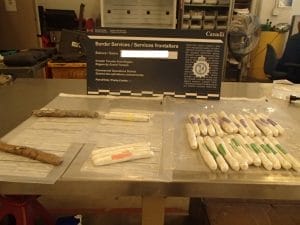by Jason Tarnow | Jul 18, 2017 | Crime, Legal Rights, Media, Police, Social Media, Wheels Of Justice
Ah, Canada.
Home of poutine, maple syrup, hockey, and….marijuana.
Some of the most highly coveted strains in the world are (apparently) found here in British Columbia. And finally, after Harper’s “War on Drugs” admitted crushing defeat, our Government is ready to rake in the dough from what will likely become one of Canada’s most profitable sectors: the sale of government regulated cannabis.
Of course news that Canada will finally be legalizing and regulating the sale of marijuana has received mixed reactions. Generally, though, the feedback has been positive. Taking marijuana out of the hands of drug dealers and instead putting it in the pockets of politicians seems like an excellent idea – right?
But on a more serious note, the legalization of marijuana brings forward a myriad of other issues. One of the most concerning topics is how police will combat drug-impaired drivers. Currently, police are permitted to conduct Standardized Field Sobriety Tests if they suspect a driver is drug-impaired. If the police do believe the person is drug impaired, a doctor monitored blood test must be conducted. Due to a lack of resources, it is often not practicable for police to transport the suspect to the hospital for such testing. As a result, these matters are generally less likely to be prosecuted.
Let’s be realistic: it is highly unlikely that anyone has been refraining from marijuana use while awaiting news of legalization. While we may see increased use over all due to the fact that certain retailers will be licensed to sell marijuana (think Shoppers Drug Mart and London Drugs), the fact of the matter is that people have been driving stoned for years – but the legalization of marijuana is likely to put more stoned drivers on the road. Our government is prepared to fight back by implementing new legislation that gives the police more authority to test suspected drug-impaired drivers roadside. Here’s the proposal:
- Allow police to demand oral samples at roadside from suspected drug-impaired. An instrument similar to an Approved Screening Device is currently being manufactured and tested;
- Allow police to proceed with a drug recognition evaluation or blood sample in circumstances where they have reasonable grounds to believe that an offence has occurred.
- Allow police to provide opinion evidence in Court regarding their belief that a driver was impaired by a drug at the time of testing. No expert opinion from an external source would be required. This eases the burden on the prosecution to prove the elements of an offence.
Keeping our roadways safe is something every single person, motorist or pedestrian, can get behind. In doing so, however, it is important that we uphold the values contained in our Charter – i.e. no motorist should be arbitrarily detained, which could be a direct result of a simple traffic stop turned drug-impaired investigation if this new legislation succeeds through Parliament. Police officers are not, by virtue of their employment, drug recognition experts. That knowledge comes from medical training which is obtained through intensive study under skilled professionals.
If the proposed legislation does succeed it will be scrutinized through various Charter challenges, prompting amendments to the legislation. It will likely fare similar to how the IRP regime was, and still is, highly criticized by many professionals.
If you are pulled over and police suspect you are under the influence of marijuana or any other drug, the first thing you should do is remember your right to silence. The only exceptions to the silence rule:
- Identify yourself upon request;
- Request to phone 604-278-0555 and speak with David Tarnow or Jason Tarnow.
Our firm is highly skilled in dealing with impaired (alcohol or drug) driving cases. While it may seem like an “open and shut case” with the evidence stacked against you, this area of law is extremely complex and requires the attention of a seasoned criminal defence lawyer. With over 50 years combined experience, the lawyers at Tarnow Law Offices have the knowledge and strategies to help you through this incredibly stressful time.
We are conveniently located in Richmond, B.C. only a few steps away from Brighouse Station on the Canada Line, which brings you from various locations in Metro Vancouver in 20 minutes. We service all areas of the lower mainland (including but not limited to Surrey, New Westminster, Port Coquitlam, North Vancouver, and Abbotsford) the interior of B.C. (including but not limited to Cranbrook, Kelowna, Kamloops, and Salmon Arm), Northern B.C. (including but not limited to Prince George, Prince Rupert, and Quesnel) and in the Yukon Territory where we offer services in Whitehorse, Dawson City, and Old Crow.
by Jason Tarnow | Jul 14, 2017 | Crime, Police, Social Media, Uncategorized
 On December 3, 2012, Mr. G (name redacted for privacy), owner of the trucking company he was transporting for, was arrested after 23 kilograms of cocaine was found hidden in a secret compartment in his vehicle.
On December 3, 2012, Mr. G (name redacted for privacy), owner of the trucking company he was transporting for, was arrested after 23 kilograms of cocaine was found hidden in a secret compartment in his vehicle.
Obviously, this product was not something Mr. G had declared when crossing into Canada – he had advised CBSA that he had just picked up two loads of produce from California and nothing more.
CBSA officers didn’t buy it.
A power drill was used on the exterior front wall of the trailer, and after it had penetrated through the wall of the trailer, it was removed – covered with a powdery white substance, later determined to be cocaine. Mr. G denied all allegations that he was involved in any drug trafficking, and claimed he had no knowledge of the drugs being in his vehicle.
Once drugs were found, the front wall of the trailer was removed, exposing 5 sub compartments, and 23 red bricks of cocaine, weighing 1 kilogram each, appraised at a value of 2 million dollars on the street.
Mr. G was arrested and charged with one count of importing a controlled substance, and one count of possession of cocaine for the purpose of trafficking.
He was the driver of the truck, the owner of the company, and the lone occupant in the vehicle at the time of his arrest. In acquitting Mr. G, the Judge noted several things of great importance:
1) The case against Mr. G was entirely circumstantial (in legal context, circumstantial evidence requires that an inference be made to determine a conclusion. Direct evidence, such as eye witness testimony, or DNA evidence, does not require that an inference be made). As this comment was made by the Judge, it is safe to assume that there was no physical evidence linking Mr. G to the crime (fingerprints on the drug wrapping, etc);
2) All of the officers who dealt with Mr. G described him as being cooperative, and showing no signs of suspicious behavior. This is crucial to Mr. G’s defence that he was unaware of the contraband in his vehicle. CBSA officers are skilled in identifying suspicious and evasive behavior – their ability to do their jobs effectively depends on it.
3) The Crown’s argument simply did not make sense. The condition of Mr. G’s vehicle (his cargo being in disarray, mainly) is what originally drew suspicion from CBSA. The Judge found that it is unlikely any drug trafficker would exercise such a low level of care and diligence in preparing to cross the border with such a significant quantity of drugs. Had Mr. G known what was truly in his trailer, he likely would have taken much more time to appear organized, and as such, not draw suspicion.
After nearly 5 years awaiting his fate, Mr. G walked out of the B.C. Supreme Court today a free man – something he likely will never take for granted.
The Courts of British Columbia are determined to curb the increasing volatile consequences of drug trafficking. While it has always been harmful to our communities, the number of fatalities associated with illicit drug use is growing ever higher. Our government is now taking a different approach to the problem by focusing on harm reduction for drug users – this includes safe injection sites, and immunity from prosecution for good Samaritans who seek help for drug overdoses. It does not include leniency for drug dealers: see our blog post on this topic.
Lengthy custodial sentences are becoming more and more common. It is increasingly obvious that conditional sentences have not adequately served as deterrents for drug traffickers to cease their illegal activities. Amendments to the Criminal Code in the coming years will likely bring even tougher penalties.
As demonstrated in Mr. G’s case, legal issues related to importing and trafficking are highly complex. A conviction for such a charge will permanently bar you from entering the United States, and will likely result in a host of other negative consequences. It is also wise, when traveling between the USA and Canada, to know what goods you are and aren’t allowed to transfer between borders.
If you have been charged, or if you are under investigation, it is strongly recommended that you contact our office to discuss your options. We are conveniently located minutes from the Brighouse station of the Canada Line, making our office easily accessible from various spots in Metro Vancouver. We are proud to provide services to all cities in the lower mainland including Richmond, Burnaby, Surrey, Langley, Port Coquitlam, Abbotsford, and Chilliwack. We also service residents located in the interior/northern areas of BC including but not limited to Kelowna, Kamloops, Penticton, Fort St. James, and Nelson.
by Jason Tarnow | Mar 9, 2017 | Crime, Criminal Attorney, Legal Rights, Police, Social Media, Wheels Of Justice
The scales of justice weighed in favour of an Accused woman earlier this week, when the Ontario Superior Court upheld her acquittal of impaired driving related charges in Ontario.
Kimberly McLachlan was acquitted of impaired driving in August 2015 after she succeeded in having evidence inadmissible at Trial – her breathalyzer readings, to be specific. This is known as a Charter application, as it seeks to have evidence excluded based on a breach of a Charter protected right.
Her application was based on the fact that when she taken to the police detachment, where she was required to provide a breathalyzer sample, the arresting officers’ had her stand on a scale so that they could have an accurate record of her weight.
Unfortunately, their attempt to be thorough actually triggered a breach of Ms. McLachlan’s section 8 under the Charter – providing protection against unreasonable search and seizure.
It is not part of standard procedure that the police would weigh a person who has been arrested on suspicion of impaired driving. The Judge confirmed that weighing a person is a violation similar in nature to taking bodily fluids (such as a urine or blood) without a warrant.
It is nuances like this – something seemingly harmless – that will catch the attention of a skilled criminal lawyer. Circumstances like these demonstrate the necessity of hiring a criminal lawyer who is familiar with Charter protected rights.
Impaired driving is a particularly complex offence, with a variety of available defences that must be reviewed in tandem with your unique circumstances. Contact our office today for a consultation that will allow us to come familiar with your situation.

by Jason Tarnow | Nov 7, 2016 | Crime, Legal Rights, Media, Social Media, Uncategorized, Wheels Of Justice

Offensive and shocking cellphone footage has led to criminal charges for a 49 year old man from Hope, B.C.
Karry Corbett received a $110 parking ticket, which initiated a heated exchange between Corbett and the parking enforcement officer. Ravi Dhura, of South Asian descent, was an innocent bystander who noticed the altercation between Corbett and the parking officer, and pulled out his cellphone to film the incident.
This led to Corbett turning his rage to Dhura, hurling obscene remarks directed at Dhura’s nationality, telling him to “go back to India” at one point, and then raising a fist and proclaiming “white power”. The comments made by Corbett aren’t difficult to interpret, which is clear by the reaction of the public. Comments on social media called for Corbett to be charged with a hate crime, but there were no such charges recommended by the RCMP.
“When did you come to Canada?” asked Corbett of Dhura, who replied that he was born a Canadian citizen. Corbett made many comments similar to that one – clearly indicated his belief that Mr. Dhura must have immigrated here at some point, alleging he was not Canadian born.
After a fairly brief review of the evidence, Crown Counsel approved 2 counts of assault, one count of uttering threats, and one count of causing a disturbance – charges that aren’t foreign to Mr. Corbett. According to RCMP he has a lengthy criminal record for similar offences, including 2 matters currently before the Courts.
Now, the public is wondering why, in the face of clear racism, there is no talk of prosecuting a hate crime. There has also been speculation on social media of how Corbett can be charged with 2 counts of assault when there was no physical contact.
The answer is easily drawn from the definition of Assault in the Criminal Code.
As you will see, the definition of assault is broad enough to include indirect force. Upon watching the video it is easy to see how Mr. Dhura, and the parking enforcement officer, would feel threatened.
As for the hate crime, there is no offence named “hate crime” in the Code, however, in this situation, Section 319 – Public Incitement of Hatred, would seem most fitting. Ultimately, Crown Counsel reviewed the available evidence, and determined that such charges would be inappropriate in Mr. Corbett’s circumstances. While some have indicated that charging Mr. Corbett for his comments infringes on his Constitutional right to Freedom of Speech, there are limitations. These limitations are set by our societal values, and rule of law that protect any and all individuals from being the victim of hateful speech.
Instances of hate propaganda and hateful speech in Metro Vancouver and surrounding communities such as Surrey, Richmond, Burnaby, Abbotsford and other Valley municipalities are steadily increasing. In January 2016, during an influx of Syrian Refugees settling in Canada, over 100 people were pepper sprayed by one disgruntled citizen at a gathering in Vancouver, B.C. RCMP indicated that kind of attack could constitute a hate crime.
Then, in August 2016, a Turkish speaking man was beaten in Vancouver for “speaking a foreign language” according to his attacker. RCMP confirmed they would be investigating that situation as a hate crime, however, it resulted in assault charges being laid against a 54 year old man.
In modern day society, social media has proven to be a useful tool in gauging the public’s tolerance for racism – this situation demonstrates that Mr. Corbett’s actions simply went too far. However, as our judicial system provides, Mr. Corbett is innocent until proven guilty.

The issues that are raised in matters like these are complex and require the expertise of seasoned criminal lawyers – therefore if you, or anyone you know, face a situation similar to Mr. Corbett’s, contact our office today to discuss your next steps.

by Jason Tarnow | Sep 12, 2016 | Crime, Legal Rights, Media, Police, Social Media, Wheels Of Justice
A vigilante group based out of Surrey, B.C., has been making headlines lately for their efforts in identifying and publicizing child predators to the media via video. It’s a spin-off of Dateline’s “To Catch a Predator”.
The videos, which are publicly posted to the group’s Facebook and Youtube accounts, display the real-time encounters had between members of the group and the individual that they have led there with false promises of sexual relations with an underage person, after chatting online about it.
The encounters are brief, lasting only a few minutes at most. The exchange between the two parties consists of accusations from one side, and flat out denials from the other. The subject of the Creep Catcher’s “investigation” attempts to shield his face before turning and running in the other direction, continually denying the allegations. What happens beyond that point is unknown.
From what I’ve seen, the public seems to be pleased with the endeavors of Creep Catchers. The videos certainly provide shock value – generally, the public does not play a role in, or even have the opportunity to witness the apprehension of a suspected pedophile – and for good reason.
The investigations that are conducted with respect to these offences are complex, calculated and require significant resources and manpower. The Integrated Child Exploitation Unit of the RCMP works with Interpol and police agencies around the world to gather, sort, and analyze information that advances their efforts in identifying, charging, and convicting individuals of child-related offences such as the Possession and Distribution of Child Pornography.
There are tactical strategies that require a high degree of skill and experience to be carried out effectively. The process of gathering evidence before an arrest and charge approval is paramount to the success of the investigation – in cases like these, proper identification of the suspect can take a significant amount of time. And this is where the work done by the RCMP and the work done by Creep Catchers become astoundingly diverse. Creep Catchers does not have the resources, funding, experience or skill to be meddling in these matters. There are several risks that come to mind:
1) Meeting these individuals in a public place, at a busy time of day, poses a serious risk to innocent bystanders in the area. Creep Catchers does not know if the individuals they are liaising with are violent or mentally ill. Innocent people could be caught in the cross-hairs of an encounter that quickly gets out of hand;
2) The police may already be conducting an investigation on an individual who has been sought out by Creep Catchers. This could lead to that entire investigation collapsing;
3) The very real possibility that they may wrongfully accuse someone of these crimes. The repercussions of being wrongfully blamed could be permanent. It is extremely difficult to exonerate someone on such allegations.
While their intentions may be good, the ends do not justify the means. This work is best left to the police.
Accessing, distributing, and making child pornography available are some of the most serious offences in the Criminal Code. There are new mandatory minimum jail sentences for these offences, details of which can be found here. Aside from a custodial sentence, someone convicted of one of these offences will almost definitely be required to register as a sex offender, which comes with lifelong consequences.
Our offices frequently handle cases with similar allegations. If you have been charged with one of these offences, contact our office to retain a criminal lawyer who can assist in navigating you through the criminal justice system with your best interests in mind.
by Jason Tarnow | Jun 2, 2016 | Crime, Criminal Attorney, Media, Police, Politics, Social Media, Wheels Of Justice
Distracted driving. It’s a hot topic these days – it seems that technology is steadily advancing, while our common sense refuses to evolve. It’s an issue that, in some ways, exploded overnight. Ever since our provincial government implemented the Immediate Roadside Prohibition scheme, the focus has been centered on impaired driving. As the number of drunk driving related fatalities (supposedly) continues to fall as a result of the IRP system (in fact our Government now says that distracted driving is the leading cause of death on roadways in BC), lawmakers have narrowed in on distracted driving – to be specific, reanalyzing the financial and disciplinary consequences of being caught while talking on an electronic device while driving. Brace yourselves: the pain train is coming.
If you’ve been using your phone while driving, trying to send that one last text, or fumbling with your playlist while going unnoticed, all the while scanning intersections for police cruisers…well, today’s the day you might want to quit. As of June 1, 2016, fines handed out by police have increased from $167 to $368. Further, a driver will now receive 4 penalty points instead of 3 – and 4 points is all that’s required for a $175 penalty towards your insurance. So basically, on your first offence, it’ll cost you $543. If you get caught a second time within 12 months, that penalty will cost you $888, and you risk losing your license for 90 days (click here to be redirected to the ICBC penalty point premium information page).
It’s important to remember that although nearly every article you’ll read about this topic will use the term distracted driving, the real offence that is being described is the use of an electronic device while driving. You are still safe to drink your coffee and eat your bagel (for now) (and please do so responsibly). Please remember that driving with your cellphone wedged between your shoulder and ear isn’t a legal loophole – it almost worked for this guy, but he lost on appeal). Also make sure to check out this post which touches on the hypocrisy of one of RoadSafety’s policies.
It’s also important to remember that the tickets handed out for this offence are not criminal charges, rather, they are issued under the Motor Vehicle Act. As of right now, these violation tickets are still heard before a Provincial Court Judge within the jurisdiction of issue. The offices of Tarnow & Company and Jason D. Tarnow Law Corporation are both well equip with criminal lawyers to handle the trials of these matters, in any jurisdiction of the lower mainland, including but not limited to Richmond, Vancouver, Surrey, New Westminster, etc.
If you receive a ticket for talking on your cellphone while driving, or any other section of the Motor Vehicle Act, contact our office within 30 days (time limit for dispute) of receiving the ticket for advice regarding the best course of action. We also handle appeals of driving prohibitions that come as a result of an unsatisfactory driving record.





